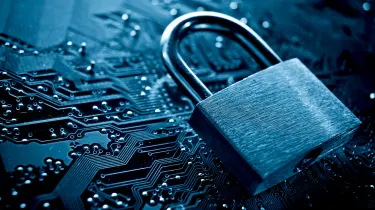In the vacation rental market, homeowners often put safety precautions in place to safeguard both themselves and the visitor. A few examples of these precautions include having insurance, damage deposits, rental agreements, home regulations, and more.
What about the internal component if you have your whole vacation rental company safeguarded from the outside? We’re not referring to the inside of your home but rather to your computer. Have you ever considered online data security for your customers and your company?
Whether a visitor makes a reservation or makes an inquiry, you must securely capture the personal information they provide. You have a responsibility to preserve all guest information as the proprietor of a vacation rental company. You must secure not just the data but also your system and apps in addition to the data.
To determine what hazards your company is facing, let’s first look at some of the potential ones that might exist online:
1. Viruses
Any program that was purposefully developed to damage computers is known as malware. Various channels, including phishing emails and rogue networks, have the potential to infect your device. Malware that steals data is the most dangerous kind of malware for managers or owners of holiday rentals. Threat actors could use the information to contact the owners and demand payment in exchange for the safe return of their data.
2. Phishing scams
Spam is an assault method that just uses trickery. They claim to be a legitimate type of contact from a source they trust to trick their victims into believing they are. Spam often has negative consequences, including viruses, data loss, financial loss, and identity theft of a person or business. In essence, spams are what makes a hoax successful.
3. Attacks that Deny Service
When a threat actor bombards a system, like a company website, with erroneous requests, they are preventing genuine users from accessing it. This is known as a denial of service attack. As a result of the victim being denied entry, they suffer financial loss. Attacks like these often target bigger businesses or organizations with more traffic.
How can security be enhanced while protecting your data?
In most nations, data protection is also required by law and is essential for all businesses, regardless of size. Now that you are aware of the dangers, you must take precautions to safeguard your internet company and avert any security risks.
The following are eight crucial steps you should take:
1. Install a firewall first
A firewall serves as a physical or virtual barrier to stop viruses, hackers, and other con artists. In essence, it serves as your first line of protection against attacks online. To stop any dangerous activity from entering your system, this barrier filters, analyses, and regulates the information that is passed across it. Prospective cyberthreats
Businesses were subjected to phishing scams and cyberattacks in 62% of cases last year. Because we live in a digital age, it’s more crucial than ever to be vigilant and aware of cyber risks that might harm your company.
Once you’ve set up a firewall, be sure to keep it updated as new threats are discovered every day. Additionally, this will shield your website from any potential harm. Any websites built with Logable are secured by the same cutting-edge firewall that protects the platform itself.
2. Add antivirus protection
To protect your devices against worms, viruses, and other types of malware, anti-virus software is essential. In addition, contemporary antivirus software can examine unusual system activity and may identify hacked systems.
Most viruses can’t infiltrate weak computers if an antivirus is installed and a firewall is in place. Even assaults from the newest malware may be avoided by regularly upgrading the virus signatures on antivirus software.
3. Use robust passwords
Avoid using the same password for all of your accounts and software—this is recommended. Make your passwords special and one-of-a-kind. Using a combination of numbers, letters, lowercase, uppercase, and special characters, create safe passwords.
Don’t create a single user with a single password for multi-user accounts. You may also provide them access to just the sections you want them to utilize by creating specific users. Make sure everyone uses unique passwords, of course.
4. Watch Out for Email Scams
Avoid clicking any links in suspicious emails and immediately block the sender’s address if you have any concerns about the email itself. Whether it is from a reputable corporation or organization, get in touch with them to find out if it was created by them or if it is a fake.
Keep in mind that no business nowadays will contact you to request your payment information. Therefore, presume it’s spam if you ever get an email asking for the information of your credit card.
A spam filter is a great tool for identifying and storing spam emails. Phishing training is crucial for businesses with a big number of workers so that people can recognize spam emails from genuine ones.
Check the URL of any link supplied to you through email as another fast piece of advice. The con artist may have taken the URL of another website and changed a letter. Verify it against the actual site’s true URL. They are spam if they vary.
5. Provide a Safe Payment Option
One of the safest payment options accessible to vacation rental companies is credit cards. Strong fraud protection is provided by credit cards, and charge reversals are simple. It is thus strongly recommended that you accept this form of payment from your rental company.
Additionally, it is the mode of payment that visitors choose the most. The ability to pay with a credit card is a terrific approach for customers to safeguard their money and guard against fraud.
6. Your computer’s monitor connections
Malicious software such as viruses and malware may be discovered on USB drives, external hard drives, cellphones, and other electronic devices. Therefore, be cautious of external devices that connect to your computer and make sure they are virus-free.
And this applies to any networks you could connect to, both wired and wireless. You are more vulnerable to assaults and at greater risk of having your data stolen if you connect to untrusted networks.
7. Adopt Strict Privacy Principles
Make sure your visitors understand how you plan to utilize their personal information by explaining why you are collecting it and for what reason. On your website, include a clear privacy statement and a permission box that visitors must check to confirm their agreement with it. Include a permission form for marketing emails as well if you want to send them.
It’s crucial to assure customers that their data won’t be shared with other businesses. Don’t request any more information than you need. If anything were to happen, the harm might be greater the more information you have in your system.
A privacy policy will also provide visitors with the assurance and trust they need to reserve your property.
8. Include SSL Encryption on your website
Any website that has SSL encryption, or HTTPS in the URL, is secure and secure to use.
Any website that collects and transmits customer information must utilize SSL encryption to ensure the privacy and security of such information. So crucial that in 2017, Google even stopped displaying websites without an SSL certificate.
This serves as an additional layer of security for visitors, who will feel more at ease when making a booking or payment on your website. They will be aware that their private information won’t get into the wrong hands. Additionally, improving your website’s SEO is another benefit of getting an SSL certificate.
Why is data security so crucial?
Data theft and sale on the dark web are becoming quite routine occurrences. Therefore, while managing personal data, all organizations need to be extra cautious. Any data breach may result in costly penalties and other legal repercussions.
Three of the most significant legal requirements to be aware of are listed below:
1. Strong Customer Authentication
Strong Customer Identification (SCA) is a new European legislative requirement that adds a second level of authentication at the checkout to decrease fraud and increase the security of online payments. This makes it more difficult for transactions to be fraudulent.
As a result of having extra security checks while paying for their stay, visitors will be even more protected if you make this information available on your vacation rental website.
2. PCI DSS
Payment Card Industry Data Security, or PCI DSS, is a security requirement for all companies that accept card payments since they include sensitive client data. All payment data must be kept in a secure environment as per PCI DSS requirements.
Your vacation rental company must adhere to PCI DSS to guarantee the security of the credit card information of visitors. Since Lodgable complies with PCI DSS, your visitors’ personal information is automatically secured. You may have peace of mind by setting up a website for your holiday rental on Lodgable, which makes all visitor payments unreachable.
3. GDP
A law known as the General Data Protection Regulation was published in May 2018. Any business that handles client data must abide by it. This implies that as a vacation rental owner, you must comply with this rule and maintain the privacy of all visitor information.
With GDPR, corporations will be required to handle information privacy in a new way while also protecting the privacy of individuals of the European Union. People have the “right to be forgotten” by the new data protection legislation. Therefore, the host is required by law to erase the guest’s data from all devices if they make that request.
According to the legislation, homeowners must notify visitors if there is a data breach or if their guests’ personal information has been exposed. They may be fined, depending on the severity.
It’s advisable to address GDPR requirements on your website, like the privacy policy, so that visitors are informed of their rights.
Note that the US is exempt from the GDPR. However, you must abide by it if you have any visitors from the EU. Additionally, you must ensure that your machine is 3DS secure.
All of these precautions are necessary to safeguard both the data of your visitors and your online vacation rental company. It’s critical to stay current with local, state, and federal rules and regulations and to make sure that nothing is ever compromised.









